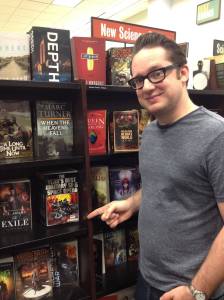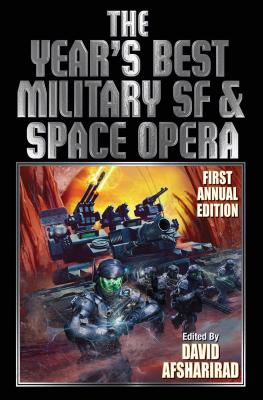The Hardest Part: David Afsharirad on The Year’s Best Military Science Fiction and Space Opera
← Paul Kincaid's From the Other Side, May 2015: The Clarke Awards and new releases from Kirsty Logan, Peter Higgins, and Paolo BacigalupiComing to Town: Darin Kennedy for The Mussorgsky Riddle, at Flyleaf Books this Sunday →
The Hardest Part: David Afsharirad on The Year’s Best Military Science Fiction and Space Opera
Posted on 2015-06-03 at 16:18 by montsamu
I think that I first met David Afsharirad at an NCSU MFA get together a year years ago now, ahead of fall classes getting started one late summer. With his trademark thick-black-rimmed glasses and friendly, casual air, I looked forward to seeing him around at readings and other events, catching up on what he was reading, how his writing and teaching were going. I was beyond thrilled when he joined Baen Books as a consulting editor and copywriter, and still, my eyes opened pretty widely when Baen announced Afsharirad as the editor for a new annual anthology series for The Year’s Best Military Science Fiction and Space Opera — as the press release put it, he was certainly a “newcomer” to that level. Still, Afsharirad had his life-long interest in short sf to lean on, his (by then) two years copy editing for Baen, his work with John Kessel at NCSU, as well as the support of rest of the Baen brain-trust in this area of short sf literature. (No shortage to be had, there, as he notes in his acknowledgements.) You can get a further sense of Afsharirad’s passion for short sf in his preface, which along with David Drake’s excellent introduction (offering a brief survey of both space opera and military sf) is available in the sample chapters at Baen’s website, and you might get a sense as to the book’s success by a short snippet from Publishers Weekly’s starred review: “Every story takes the reader on a fascinating, thought-provoking, enjoyable journey into the militarized future.”
Here, Afsharirad writes about the hardest part of putting this first annual edition of the anthology together, work that included scouring the hundreds (thousands) of stories under his remit, resulting in an anthology which draws from online magazines (Clarkesworld, Galaxy’s Edge, Lightspeed, and Baen.com), print magazines (with “the big three” of F&SF, Analog, and Asimov’s all represented), and themed anthologies (War Stories, Extreme Planets, and Monstrous Affections) alike. But how to pick the best from the good? That’s the question at hand.
The slush pile, that quagmire of stories that clutters every editor’s desk. It’s full of dreck, of course, but it must be read. Because occasionally one finds among the detritus a truly worthy piece of writing. Editors complain about reading slush all the time, and it is true that working your way through all those manuscripts can be a slog. But really, it’s not that tough. You can usually tell within a page or two (or less, let’s be honest) if a story has what it takes to make the cut.
What’s not so easy—what is, say, the hardest part—is when the slush pile isn’t made up of unsolicited manuscripts, sent in by unknown hopefuls, many of whom have only a passing acquaintance with the English language, but of stories that have already made it past a first and second reader, past an editor, and into the pages (web or paper) of the top science fiction markets in existence. Then … then picking stories isn’t so easy.
And yet that was the task at hand when it came to selecting the contents of The Year’s Best Military SF and Space Opera. It wasn’t enough that the stories be good—all of them were at least good enough to appear in places like Galaxy’s Edge, Clarkesworld, and Analog, which is to say very good indeed. And it wasn’t enough that the stories be excellent. No, the stories that were to appear in the anthology had to be the best. Not only that, they had to be the best of a certain type, namely military science fiction and/or space opera.
That last part gave me quite a bit of trouble. I’d be reading Asimov’s or F&SF and I’d get sucked into a story. I’d read it to the end. I’d close the magazine and think, That was amazing … but it wasn’t really military science fiction and it wasn’t really space opera. I’d squint at the story, trying to justify it as one or the other, but in the end, it had to go in the “pass” pile.
Not so easy to do that, I’ll tell you.
That’s not to say that there weren’t enough good short stories published that fell within the proscribed genre. If passing up excellent stories because they didn’t fit the theme was difficult, then picking fifteen worthy stories that did fit the theme out of the multitude that were published in 2014, was equally challenging. In reading for Year’s Best … I discovered some of the most interesting, inventive, thought-provoking, thrilling, and edge-of-your-seat-exciting stories I’ve ever read. I had a pile of excellent stories to choose from, a whole lot of maybe’s. Winnowing down that pile to the fifteen tales that appear in the anthology was no easy task. But hard as it was, I think that in the end, what it says on the cover is what readers will find inside: The Year’s Best Military SF and Space Opera.
I’d like to add that you can get a taste for what it’s like to pick the best short stories of the year by voting in a new award, sponsored by Baen. The Baen Books Year’s Best Military SF and Space Opera Award will be decided by readers. The table of contents of The Year’s Best Military SF and Space Opera will act as the ballot, and readers can vote through August 31st of this year for the story that they think stands above the others. The results will be announced at DragonCon, over Labor Day weekend, with the winner taking home a plaque and a cash prize.
ABOUT THE AUTHOR
[caption id="attachment_4699" align="alignnone" width="225"] The anthologist (and his anthology) in the wild. Photo credit: Miranda Afsharirad.[/caption]
The anthologist (and his anthology) in the wild. Photo credit: Miranda Afsharirad.[/caption]
David Afsharirad is the editor of the anthology series The Year’s Best Military Science Fiction and Space Opera. He is also an editor at PINBALL, an online literature and comics magazine. A graduate of North Carolina State’s MFA in creative writing program, his work has appeared in various magazines and journals. He lives Austin, Texas with his wife and son.

